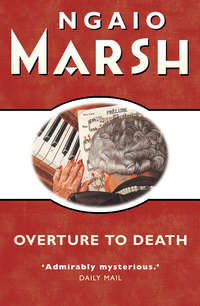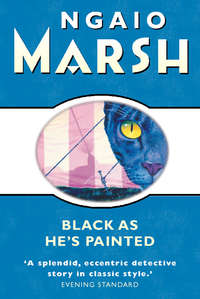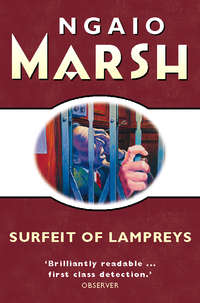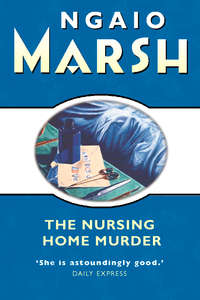
Полная версия
Dead Water
‘At the age of eighty-three,’ she said, with uncanny prescience, ‘I am not to be moved. If that is in your mind, Roderique.’
‘I’m much too frightened of you, Miss Emily, to attempt any such task.’
‘Ah, no!’ she said in English. ‘Don’t say that! I hope not.’
He kissed her dry little hand as she had taught him to do. ‘Well,’ he said, ‘tell me more about it. What is your plan?’
Miss Emily reverted to the French language. ‘In effect, as I have told you, to restore the status quo. Ultimately I shall remove the enclosure, shut the shop and issue a general announcement disclaiming and exposing the entire affair.’
Alleyn said: ‘I’ve never been able to make up my mind about these matters. The cure of warts by apparently irrational means is too well-established to be questioned. And even when you admit the vast number of failures, there is a pretty substantial case to be made out for certain types of faith-healing. Or so I understand. I can’t help wondering why you are so very fierce about it all, Miss Emily. If you are repelled by the inevitable vulgarities, of course –’
‘As, of course, I am. Still more, by the exploitation of the spring as a business concern. But most of all by personal experience of a case that failed: a very dear friend who suffered from a malignancy and who was absolutely – but I assure you, absolutely – persuaded it would be cured by such means. The utter cruelty of her disillusionment, her incredulity, her agonized disappointment and her death: these made a bitter impression upon me. I would sooner die myself,’ Miss Emily said with the utmost vigour, ‘than profit in the smallest degree from such another tragedy.’
There was a brief silence. ‘Yes,’ Alleyn said. ‘That does, indeed, explain your attitude.’
‘But not my reason for soliciting your help. I must tell you that I have written to Major Barrimore who is the incumbent of the inn, and informed him of my decision. I have announced my intention of visiting the Island to see that this decision is carried out. And, since she will no doubt wish to provide for herself, I have also written to the proprietress of the shop, a Miss Elspeth Cost. I have given her three months’ notice, unless she chooses to maintain the place as a normal establishment and refrain from exploiting the spring or mounting a preposterous anniversary festival which, I am informed, she has put in hand and which has been widely advertised in the Press.’
‘Major Barrimore and Miss Cost must have been startled by your letters.’
‘So much so, perhaps, that they have lost the power of communication. I wrote a week ago. There has been no formal acknowledgment.’
She said this with such a meaning air that he felt he was expected to take it up. ‘Has there been an informal one? ‘he ventured.
‘Judge for yourself,’ said Miss Emily, crisply.
She went to her desk, and returned with several sheets of paper which she handed to him.
Alleyn glanced at the first, paused, and then laid them all in a row on an occasional table. There were five. ‘Hell!’ he thought, ‘this means a go with Miss Emily.’ They were in the familiar form of newsprint pasted on ruled paper which had been wrenched from an exercise book. The first presented an account of several cures effected by the springs and was headed with unintentional ambiguity, ‘Pixie Falls Again.’ It was, he recognized, from the London Sun. Underneath the cutting was an irregularly assembled sentence of separated words, all in newsprint.
‘Do not Attempt THREAT to close you are WARNED.’ The second read, simply: ‘DANGER keep OUT,’ the third, ‘Desecration will be prevented all costs,’ the fourth: ‘Residents are prepared interference will prove FATAL,’ and the last, in one strip, ‘DEATH OF ELDERLY WOMAN’ with a piecemeal addendum ‘this could be you.’
‘Well,’ Alleyn said, ‘that’s a pretty collection, I must say. When did they come?’
‘One by one, over the last five days. The first must have been posted immediately after the arrival of my letter.’
‘Have you kept the envelopes?’
‘Yes. The postmark is Portcarrow.’
‘May I see them?’
She produced them: five cheap envelopes. The address had been built up from newsprint.
‘Will you let me keep these? And the letters?’
‘Certainly.’
‘Any idea who sent them?’ he asked.
‘None.’
‘Who has your address?’
‘The landlord. Major Barrimore.’
‘It’s an easy one to assemble from any paper. Thirty-seven Forecast Street. Wait a moment though. This one wasn’t built up piece-meal. It’s all in one. I don’t recognize the type.’
‘Possibly a local paper. At the time of my inheritance.’
‘Yes. Almost certainly.’
He asked her for a larger envelope and put the collection into it.
‘When do you plan to go to Portcarrow?’
‘On Monday,’ said Miss Emily composedly. ‘Without fail.’
Alleyn thought for a moment and then sat down and took her hand in his. ‘Now, my dear Miss Emily,’ he said. ‘Please do listen to what I’m going to say – in English, if you don’t mind.’
‘Naturally, I shall listen carefully since I have invited your professional opinion. As to speaking in English – very well, if you prefer it. Enfin, en ce moment, on ne donne pas une leçon de français.’
‘No. One gives, if you’ll forgive me, a lesson in sensible behaviour. Now, I don’t suggest for a minute that these messages mean, literally, what they seem to threaten. Possibly they are simply intended to put you off and if they fail to do that, you may hear no more about it. On the other hand they do suggest that you have an enemy at Portcarrow. If you go there you will invite unpleasant reactions.’
‘I am perfectly well aware of that. Obviously. And,’ said Miss Emily on a rising note, ‘if this person imagines that I am to be frightened off –’
‘Now, wait a bit. There’s no real need for you to go, is there? The whole thing can be done, and done efficiently, by your solicitors. It would be a – a dignified and reasonable way of settling.’
‘Until I have seen for myself what goes on in the Island I cannot give explicit instructions.’
‘But you can. You can get a report.’
‘That,’ said Miss Emily, ‘would not be satisfactory.’
He could have shaken her.
‘Have you,’ he asked, ‘shown these things to your solicitors.’
‘I have not.’
‘I’m sure they would give you the same advice.’
‘I should not take it.’
‘Suppose this person means to do exactly what the messages threaten? Offer violence? It might well be, you know.’
‘That is precisely why I have sought your advice. I am aware that I should take steps to protect myself. What are they? I am not,’ Miss Emily said, ‘proficient in the use of small-arms and I understand that, in any case, one requires a permit. No doubt in your position, you could obtain one and might possibly be so very kind as to give me a little instruction.’
‘I shall not fiddle a small-arms permit for you and nor shall I teach you to be quick on the draw. The suggestion is ridiculous.’
‘There are, perhaps, other precautions,’ she conceded, ‘such as walking down the centre of the road, remaining indoors after dark and making no assignations at unfrequented rendezvous.’
Alleyn contemplated his old instructress. Was there or was there not a remote twinkle in that dead-pan eye?
‘I think,’ he said, ‘you are making a nonsense of me.’
‘Who’s being ridiculous now?’ asked Miss Emily tartly.
He stood up. ‘All right,’ he said. ‘As a police officer it’s my duty to tell you that I think it extremely unwise for you to go to Portcarrow. As a grateful, elderly, ex-pupil, I assure you that I shall be extremely fussed about you if you’re obstinate enough to persist in your plan. Dear Miss Emily,’ said Alleyn, with a change of tone, ‘do, for the love of Mike, pipe down and stay where you are.’
‘You would have been successful,’ she said, ‘if you had continued in the Corps Diplomatique. I have never comprehended why you elected to change.’
‘Obviously, I’ve had no success in this instance.’
‘No. I shall go. But I am infinitely obliged to you, Roderique.’
‘I suppose this must be put down to the wild strain in your blood.’
‘Possibly.’ Indicating that the audience was concluded, she rose and reverted to French. ‘You will give my fondest salutations to your wife and son?’
‘Thank you. Troy sent all sorts of messages to you.’
‘You appear to be a little fatigued. When is your vacation?’
‘When I can snatch it. I hope, quite soon,’ Alleyn said and was at once alarmed by a look of low cunning in Miss Emily. ‘Please don’t go,’ he begged her.
She placed her hand in the correct position to be kissed. ‘Au revoir,’ she said, ‘et mille remerciements.’
‘Mes hommages, madame,’ said Alleyn crossly. With the profoundest misgivings he took his leave of Miss Emily.
II
It was nine o’clock in the evening when the London train reached Dunlowman where one changed for the Portcarrow bus. On alighting, Jenny was confronted by several posters depicting a fanciful Green Lady across whose image was superimposed a large notice advertising ‘The Festival of the Spring.’ She had not recovered from this shock when she received a second one in the person of Patrick Ferrier. There he was, looking much the same after nearly two years, edging his way through the crowd, quite a largish one, that moved towards the barrier. ‘Jenny!’ he called. ‘Hi! I’ve come to meet you.’
‘But it’s miles and miles!’ Jenny cried, delighted to see him.
‘A bagatelle. Hold on. Here I come.’
He reached her and seized her suitcases. ‘This is fun,’ he said. ‘I’m so glad.’
Outside the station a number of people had collected under a sign that read ‘Portcarrow Bus.’ Jenny watched them as she waited for Patrick to fetch his car. They looked, she thought, a singularly mixed bunch and yet there was something about them – what was it? – that gave them an exclusive air, as if they belonged to some rather outlandish sect. The bus drew up and as these people began to climb in, she saw that among them there was a girl wearing a steel brace on her leg. Further along the queue a man with an emaciated face and terrible eyes quietly waited his turn. There was a plain, heavy youth with a bandaged ear and a woman who laughed repeatedly, it seemed without cause, and drew no response from her companion, an older woman, who kept her hand under the other’s forearm and looked ahead. They filed into the bus and although there were no other outward signs of the element that united them, Jenny knew what it was.
Patrick drove up in a two-seater. He put her luggage into a boot that was about a quarter of the size of the bonnet and in a moment they had shot away down the street.
‘This is very handsome of you, Patrick,’ Jenny said. ‘And what a car!’
‘Isn’t she pleasant?’
‘New, I imagine.’
‘Yes. To celebrate. I’m eating my dinners, after all, Jenny. Do you remember?’
‘Of course. I do congratulate you.’
‘You may not be so polite when you see how it’s been achieved, however. Your wildest fantasies could scarcely match the present reality of the Island.’
‘I did see the English papers in Paris and your letters were fairly explicit.’
‘Nevertheless you’re in for a shock, I promise you.’
‘I expect I can take it.’
‘Actually, I rather wondered if we ought to ask you.’
‘It was sweet of your mama and I’m delighted to come. Patrick, it’s wonderful to be back in England. When I saw the Battersea power-station, I cried. For sheer pleasure.’
‘You’ll probably roar like a bull when you see Portcarrow and not for pleasure, either. You haven’t lost your susceptibility for places, I see. By the way,’ Patrick said after a pause, ‘you’ve arrived for a crisis.’
‘What sort of crisis?’
‘In the person of an old, old angry lady called Miss Emily Pride, who has inherited the Island from her sister (Winterbottom, deceased). She shares your views about exploiting the spring. You ought to get on like houses on fire.’
‘What’s she going to do?’
‘Shut up shop unless the combined efforts of interested parties can steer her off. Everybody’s in a frightful taking-on about it. She arrives on Monday, breathing restoration and fury.’
‘Like a wicked fairy godmother?’
‘Very like. Probably flourishing a black umbrella and emitting sparks. She’s flying into a pretty solid wall of opposition. Of course,’ Patrick said abruptly, ‘the whole thing has been fantastic. For some reason the initial story caught on. It was the silly season and the papers, as you may remember, played it up. Wally’s warts became big news. That led to the first lot of casual visitors. Mrs Winterbottom’s men of business began to make interested noises and the gold-rush, to coin a phrase, set in. Since then it’s never looked back.’
They had passed through the suburbs of Dunlowman and were driving along a road that ran out towards the coast.
‘It was nice getting your occasional letters,’ Patrick said, presently. ‘Operative word “occasional”.’
‘And yours.’
‘I’m glad you haven’t succumbed to the urge for black satin and menacing jewellery that seems to overtake so many girls who get jobs in France. But there’s a change, all the same.’
‘You’re not going to suggest I’ve got a phoney foreign accent?’
‘No, indeed. You’ve got no accent at all.’
‘And that, no doubt, makes the change. I expect having to speak French has cured it.’
‘You must converse with Miss Pride. She is, or was, before she succeeded to the Winterbottom riches, a terrifically high-powered coach for chaps entering the Foreign Service. She’s got a network of little spokes all round her mouth from making those exacting noises that are required by the language.’
‘You’ve seen her, then?’
‘Once. She visited with her sister about a year ago and left in a rage.’
‘I suppose,’ Jenny said after a pause, ‘this is really very serious, this crisis?’
‘It’s hell,’ he rejoined with surprising violence.
Jenny asked about Wally Trehern and was told that he had become a menace. ‘He doesn’t know where he is but he knows he’s the star-turn,’ Patrick said. ‘People make little pilgrimages to the cottage which has been tarted up in a sort of Peggotty-style Kitsch. Seaweed round the door almost, and a boat in a bottle. Mrs Trehern keeps herself to herself and the gin bottle but Trehern is a new man. He exudes a kind of honest-tar sanctity and sells Wally to the pilgrims.’
‘You appal me.’
‘I thought you’d better know the worst. What’s more, there’s an Anniversary Festival next Saturday, organized by Miss Cost. A choral procession to the Spring and Wally, dressed up like a wee fisher lad, reciting doggerel if he can remember it, poor little devil.’
‘Don’t!’ Jenny exclaimed. ‘Not true!’
‘True, I’m afraid.’
‘But Patrick – about the cures? The people that come? What happens?’
Patrick waited for a moment. He then said in a voice that held no overtones of irony: ‘I suppose, you know, it’s what always happens in these cases. Failure after failure until one thinks the whole thing is an infamous racket and is bitterly ashamed of having any part of it. And then, for no apparent reason, one, perhaps two, perhaps a few more, people do exactly what the others have done but go away without their warts or their migraine or their asthma or their chronic diarrhoea. Their gratitude and sheer exuberance! You can’t think what it’s like, Jenny. So then, of course, one diddles oneself – or is it diddling? – into imagining these cases wipe out all the others and all the ballyhoo, and my fees and this car, and Miss Cost’s Giffte Shoppe. She really has called it that, you know. She sold her former establishment and set up another on the Island. She sells tiny plastic models of the Green Lady and pamphlets she’s written herself, as well as handwoven jerkins and other novelties that I haven’t the face to enumerate. Are you sorry you came?’
‘I don’t think so. And your mother? What does she think?’
‘Who knows?’ Patrick said, simply. ‘She has a gift for detachment, my mama.’
‘And Dr Maine?’
‘Why he?’ Patrick said sharply, and then: ‘Sorry: Why not? Bob Maine’s nursing home is now quite large and invariably full.’
Feeling she had blundered, Jenny said: ‘And the Rector? How on earth has he reacted?’
‘With doctrinal léger de main. No official recognition on the one hand. Proper acknowledgments in the right quarter on the other. Jolly sensible of him, in my view.’
Presently they swept up the downs that lie behind the coastline, turned into a steep lane and were, suddenly, on the cliffs above Portcarrow.
The first thing that Jenny noticed was a red neon sign, glaring up through the dusk: ‘Boy-and-Lobster.’ The tide was almost full and the sign was shiftingly reflected in dark water. Next, she saw that a string of coloured lights connected the Island with the village and that the village itself must now extend along the foreshore for some distance. Lamps and windows, following the convolutions of bay and headland, suggested a necklace that had been carelessly thrown down on some night-blue material. She supposed that in a way the effect must be called pretty. There was a number of cars parked along the cliffs with people making love in them or merely staring out to sea. A large, prefabricated, multiple garage had been built at the roadside. There was also a café.
‘There you have it,’ Patrick said. ‘We may as well take the plunge.’
They did so literally, down a precipitous and narrow descent. That at least had not changed and nor at first sight had the village itself. There was the old post-office-shop and, farther along, the Portcarrow Arms with a new coat of paint. ‘This is now referred to as the Old Part,’ said Patrick. ‘Elsewhere there’s a rash of boarding establishments and a multiple store. Trehern, by the way is Ye Ancient Ferryman. I’ll put you down with your suitcase at the jetty, dig him out of the pub and park the car. OK?’
There was nobody about down by the jetty. The high tide slapped quietly against wet pylons and whispered and dragged along the foreshore. The dank smell of it was pleasant and familiar. Jenny looked across the narrow gap to the Island. There was a lamp now, at the landing and a group of men stood by it. Their voices sounded clear and tranquil. She saw that the coloured lights were strung on metal poles mounted in concrete, round whose bases sea-water eddied and slopped, only just covering the causeway.
Patrick returned and with him Trehern who was effusive in salutations and wore a peaked cap with ‘Boy-and-Lobster’ on it.
‘There’s a motor launch,’ Patrick said, pointing to it. ‘For the peak hours. But we’ll row over, shall we?’ He led the way down the jetty to where a smart dinghy was tied up. She was called, inevitably, The Pixie.
‘There were lots of people in the bus,’ said Jenny.
‘I expect so,’ he rejoined, helping her into the dinghy. ‘For the Festival, you know.’
‘Ar, the por souls!’ Trehern ejaculated. ‘May the Heavenly Powers bring them release from their afflictions.’
‘Cast off,’ said Patrick.
The gurgle of water and rhythmic clunk of oars in their rowlocks carried Jenny back to the days when she and Patrick used to visit their little bay.
‘It’s a warm, still night, isn’t it?’ she said.
‘Isn’t it?’ Patrick agreed. He was beside her in the stern. He slipped his arm round her. ‘Do you know,’ he said in her ear, ‘it’s extraordinarily pleasant to see you again.’
Jenny could smell the Harris tweed of his coat. She glanced at him. He was staring straight ahead. It was very dark but she fancied he was smiling.
She felt that she must ask Trehern about Wally and did so.
‘He be pretty clever, Miss, thank you. You’ll see a powerful change in our little lad, no doubt, him having been the innocent means of joy and thanksgiving to them as seeked for it.’
Jenny could find nothing better to say than: ‘Yes, indeed.’
‘Not that he be puffed-up by his exclusive state, however,’ Trehern added. ‘Meek as a mouse but all-glorious within. That’s our Wally.’
Patrick gave Jenny a violent squeeze.
They pulled into the jetty and went ashore. Trehern begged Jenny to visit her late pupil at the cottage and wished them an unctuous good night.
Jenny looked about her. Within the sphere of light cast by the wharf lamp, appeared a shop-window which had been injected into an existing cottage front. It was crowded with small indistinguishable objects. ‘Yes,’ Patrick said. ‘That’s Miss Cost. Don’t dwell on it.’
It was not until they had climbed the steps, which had been widened and re-graded and came face-to-face with The Boy-and-Lobster that the full extent of the alterations could be seen. The old pub had been smartened but not altered. At either end of it, however, there now projected large two-storied wings which completely dwarfed the original structure. There was a new and important entrance and a ‘lounge’ into which undrawn curtains admitted a view of quite an assemblage of guests, some reading, others playing cards or writing letters. In the background was a ping-pong table and beyond that, a bar.
Patrick said, ‘There you have it.’
They were about to turn away when someone came out of the main entrance and moved uncertainly towards them. He was dressed in a sort of Victorian smock over long trousers and there was a jellybag cap on his head. He had grown much taller. Jenny didn’t recognize him at first but as he shambled into a patch of light she saw his face.
‘Costume,’ Patrick said, ‘by Maison Cost.’
‘Wally!’ she cried. ‘It’s Wally.’
He gave her a sly look and knuckled his forehead. ‘’Evening, ’evening,’ he said. His voice was still unbroken. He held out his hands. ‘I’m Wally,’ he said. ‘Look. All gone.’
‘Wally, do you remember me? Miss Williams? Do you?’
His mouth widened in a grin. ‘No,’ he said.
‘Your teacher.’
‘One lady gave me five bob, she done. One lady done.’
‘You mustn’t ask for tips,’ Patrick said.
Wally laughed. ‘I never,’ he said and looked at Jenny. ‘You come and see me. At Wally’s place.’
‘Are you at school, still?’
‘At school. I’m in the fustivell.’ He showed her his hands again, gave one of his old squawks and suddenly ran off.
‘Never mind,’ Patrick said. ‘Come along. Never mind, Jenny.’
He took her in by the old door, now marked Private, and here everything was familiar. ‘The visitors don’t use this,’ he said. ‘There’s an office and reception desk in the new building. You’re en famille, Jenny. We’ve put you in my room. I hope you don’t mind.’
‘But what about you?’
‘I’m all right. There’s an emergency bolt-hole.’
‘Jenny!’ said Mrs Barrimore, coming into the little hall. ‘How lovely!’
She was much more smartly dressed than she used to be and looked, Jenny thought, very beautiful. They kissed warmly. ‘I’m so glad,’ Mrs Barrimore said. ‘I’m so very glad.’
Her hand trembled on Jenny’s arm and, inexplicably, there was a blur of tears in her eyes. Jenny was astounded.
‘Patrick will show you where you are and there’s supper in the old dining-room. I – I’m busy at the moment. There’s a sort of meeting. Patrick will explain,’ she said hurriedly. ‘I hope I shan’t be long. You can’t think how pleased we are, can she, Patrick?’
‘She hasn’t an inkling,’ he said. ‘I forgot about the emergency meeting, Jenny. It’s to discuss strategy and Miss Pride. How’s it going, Mama?’








